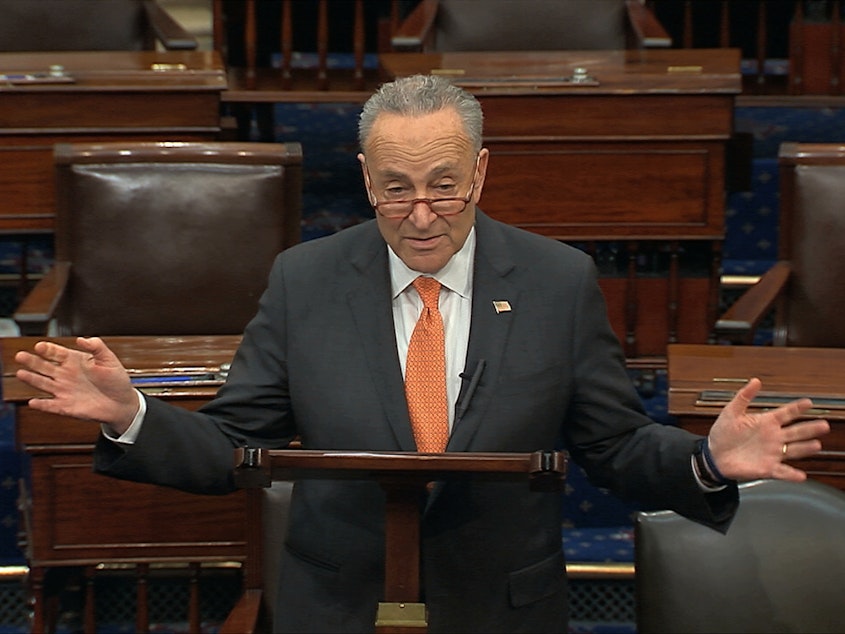Bipartisan Coronavirus Financial Rescue Deal Eludes Congress

Pressure is ratcheting up for Congress to enact an unprecedented economic relief package that will provide aid to every rung of the U.S. economy after bipartisan talks collapsed Sunday over Democratic objections.
Senate Majority Leader Mitch McConnell, R-Ky., raged against Democrats on the floor Monday ahead of another round of procedural test votes. "Why are Democrats filibustering the bipartisan bill they helped write? An appropriate question to ask this morning as the country waits on us," he said.
McConnell accused Democrats, led by Minority Leader Chuck Schumer, D-N.Y., of playing games with the economy after Democrats blocked a procedural vote on a shell bill that is quickly approaching a staggering $2 trillion price tag.
Schumer countered on the Senate floor Monday that talks with Treasury Secretary Steven Mnuchin were fruitful and could result in an agreement as early as today. "We're very close to reaching a deal," Schumer said, calling the procedural votes "irrelevant" to the ongoing talks. Schumer said that once a deal was reached, Democrats would not object to expedited consideration of what will amount to one of the most dramatic financial rescue efforts in American history.
While there is general consensus on key provisions of the package, including small business loan guarantees and direct cash payments, Democrats want more conditions placed on funds to assist large corporations to ensure, for instance, that the money goes to protect workers' jobs and not stock buybacks to benefit shareholders.
Sponsored
Democrats are also asking for more money for hospitals and more generous unemployment benefits for laid off workers — proposals that, if included, would balloon the cost of the package even more.
Republicans criticized Democrats for "last minute demands" that they see as not critical to the crisis at hand, such as new collective bargaining powers for unions, increased fuel emissions standards for airlines, and expanded wind and solar tax credits.
McConnell argued that Democrats were turning the bill into a "left wing episode of Supermarket Sweep."
Schumer told reporters early Monday morning that Democrats see this bill as their best opportunity to provide the most help. "This bill is going to affect this country and the lives of Americans, not just for the next few days, but in the next few months and years — so we have to make sure it is good," he said.
While tensions between McConnell and Schumer are high, Mnuchin has been an active participant in the negotiations, talking and meeting with Democrats all day Sunday and into the early Monday morning hours.
Sponsored
House Speaker Nancy Pelosi, D-Calif., is going to introduce a counterproposal in the House on Monday afternoon. It's unclear whether Pelosi's move is a pressure tactic on the Senate to reach a deal or a firm commitment to move a House bill. Moving forward on competing legislation could delay negotiations considerably.
House Majority Leader Steny Hoyer, D-Md., previously announced that he would not reconvene lawmakers back in Washington until there was critical legislation to vote for in response to the coronavirus pandemic.
As more lawmakers test positive for the virus, and even more self-quarantine for possible exposure, Congress itself is racing a clock to pass a bill and likely recess for at least a few weeks. While some lawmakers continue to call for allowing remote voting in the House and Senate, both Pelosi and McConnell remain resistant to the idea, which has never been done before, would require votes to change the rules of both chambers, and could face constitutional challenges. [Copyright 2020 NPR]



